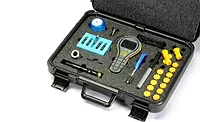ASTM changes calcium chloride standard, testing criteria
Recently, the ASTM committee changed the F1869 Calcium Chloride standard to specifically disallow Calcium Chloride testing for all lightweight aggregate concrete.
Going as far back as the 1940s, Calcium Chloride testing has been used to determine the suitable moisture content of poured concrete slabs when applying resilient floor coverings. The standard for performing the Calcium Chloride test has seen many changes over the years but both the science supporting Calcium Chloride as a test method and the reliability of the test method have remained problematic. And findings of recent studies have proven the ASTM-F1869 Calcium Chloride standard is no longer an acceptable test method for lightweight concrete.
Since 2002, ASTM-F2170 In-Situ Relative Humidity testing has been replacing Calcium Chloride as the preferred method for concrete moisture determination. Not only are RH results more consistently reliable, RH testing has also proven to be cost efficient, user friendly and more appropriate to the resilient floor covering industry. Understanding the changes and the science behind RH testing and ASTM-F2170 will help installers, developers and contractors specify the testing method best suited to give reliable, actionable results for the resilient flooring industry.
Going as far back as the 1940s, Calcium Chloride testing has been used to determine the suitable moisture content of poured concrete slabs when applying resilient floor coverings. The standard for performing the Calcium Chloride test has seen many changes over the years but both the science supporting Calcium Chloride as a test method and the reliability of the test method have remained problematic. And findings of recent studies have proven the ASTM-F1869 Calcium Chloride standard is no longer an acceptable test method for lightweight concrete.
Since 2002, ASTM-F2170 In-Situ Relative Humidity testing has been replacing Calcium Chloride as the preferred method for concrete moisture determination. Not only are RH results more consistently reliable, RH testing has also proven to be cost efficient, user friendly and more appropriate to the resilient floor covering industry. Understanding the changes and the science behind RH testing and ASTM-F2170 will help installers, developers and contractors specify the testing method best suited to give reliable, actionable results for the resilient flooring industry.
Looking for a reprint of this article?
From high-res PDFs to custom plaques, order your copy today!




